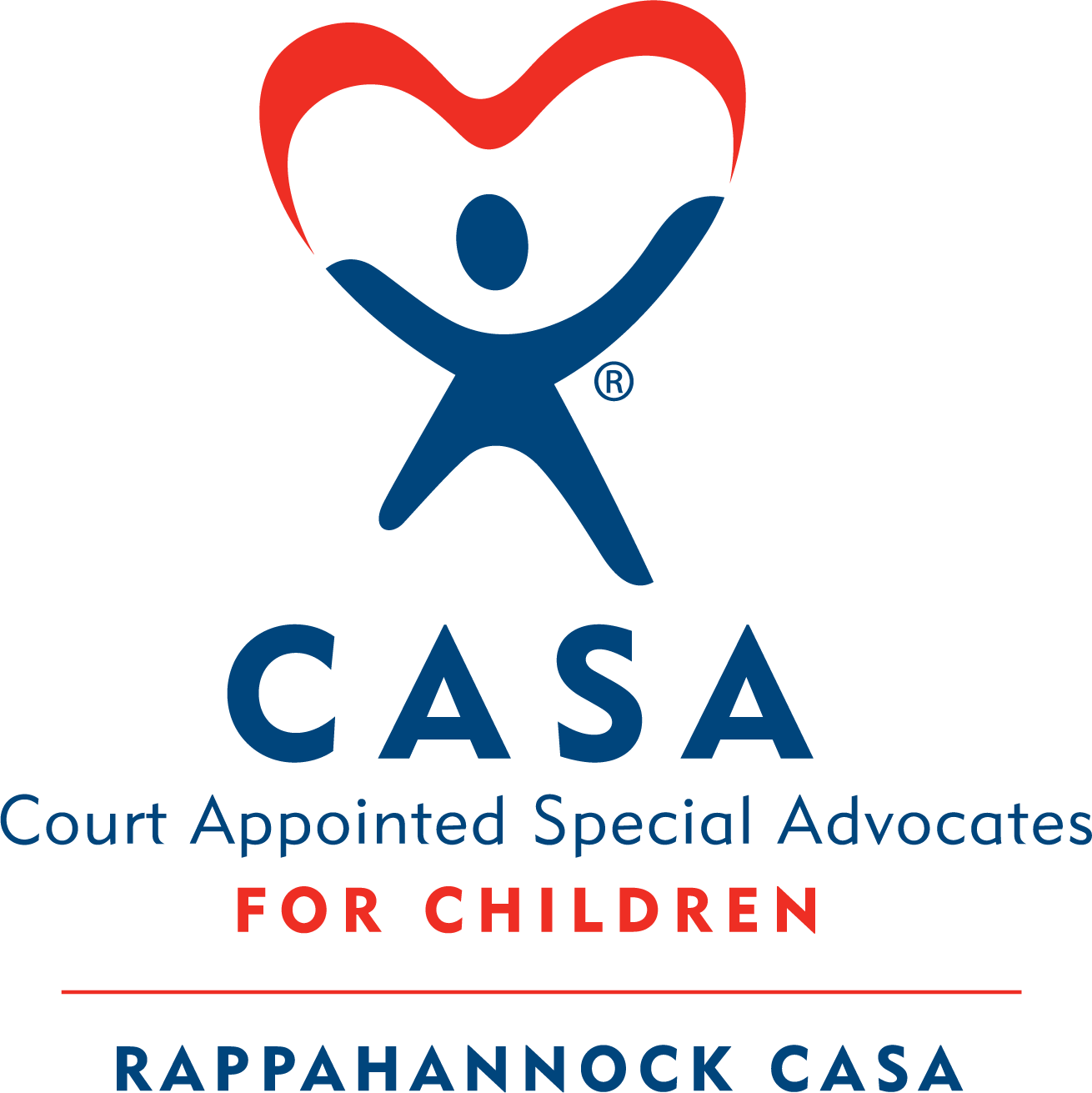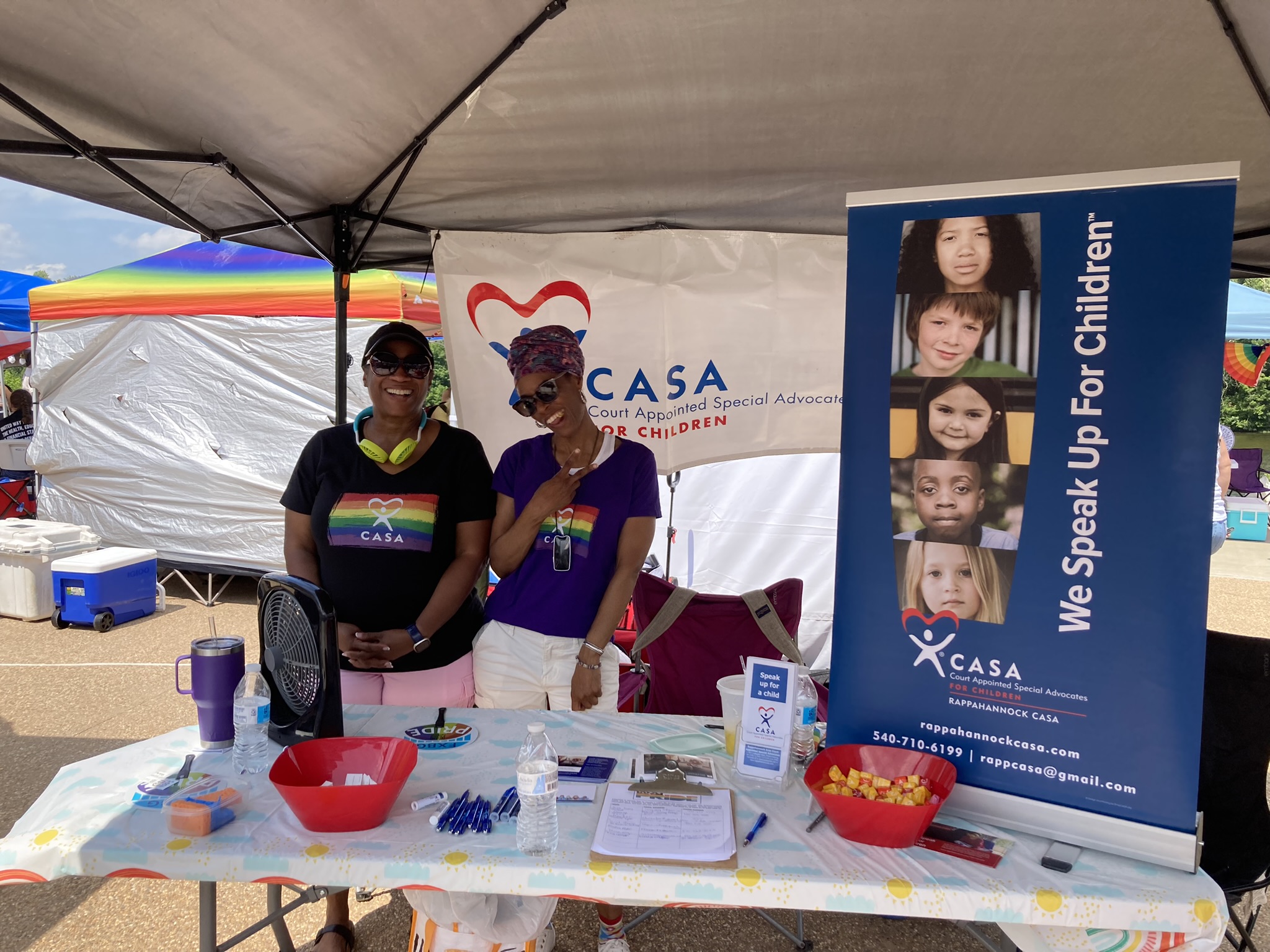Rappahannock Area CASA
2023-24 Annual Report &
Program Accomplishments
Rappahannock Area CASA is a 501(c)(3) nonprofit dedicated to advocating for abused and neglected children in the Fredericksburg area. Our program provides independent, high-quality advocacy to vulnerable children involved in court cases due to parental abuse or neglect. Most children we serve are in foster care, though some live at home under child protective orders or Child In Need Of Services petitions. Judges appoint CASA to give voice to the children’s needs.
In 2023-24:
- Rappahannock Area CASA advocated for 123 children.
- 40 volunteer advocates donated 4,855 hours of service.
- CASA volunteers submitted 127 written reports to local judges, who incorporated the vast majority of CASA’s written recommendations into their court orders.
The children our volunteers worked diligently to serve in 2023-24 included:
- A sibling group with ready access to loaded weapons and drugs
- A sibling group that reported severe beatings at the hands of a parent, while another parent stood by and did not intervene
- Several children who witnessed domestic violence in their homes, including a 6-year-old who alerted her teacher to the danger by drawing a bloody scene of her parents fighting.
- Children with severe medical conditions not being addressed by their parents
- Infants born drug-exposed, and young children suffering from chronic neglect at the hands of parents with significant substance abuse and mental health challenges.
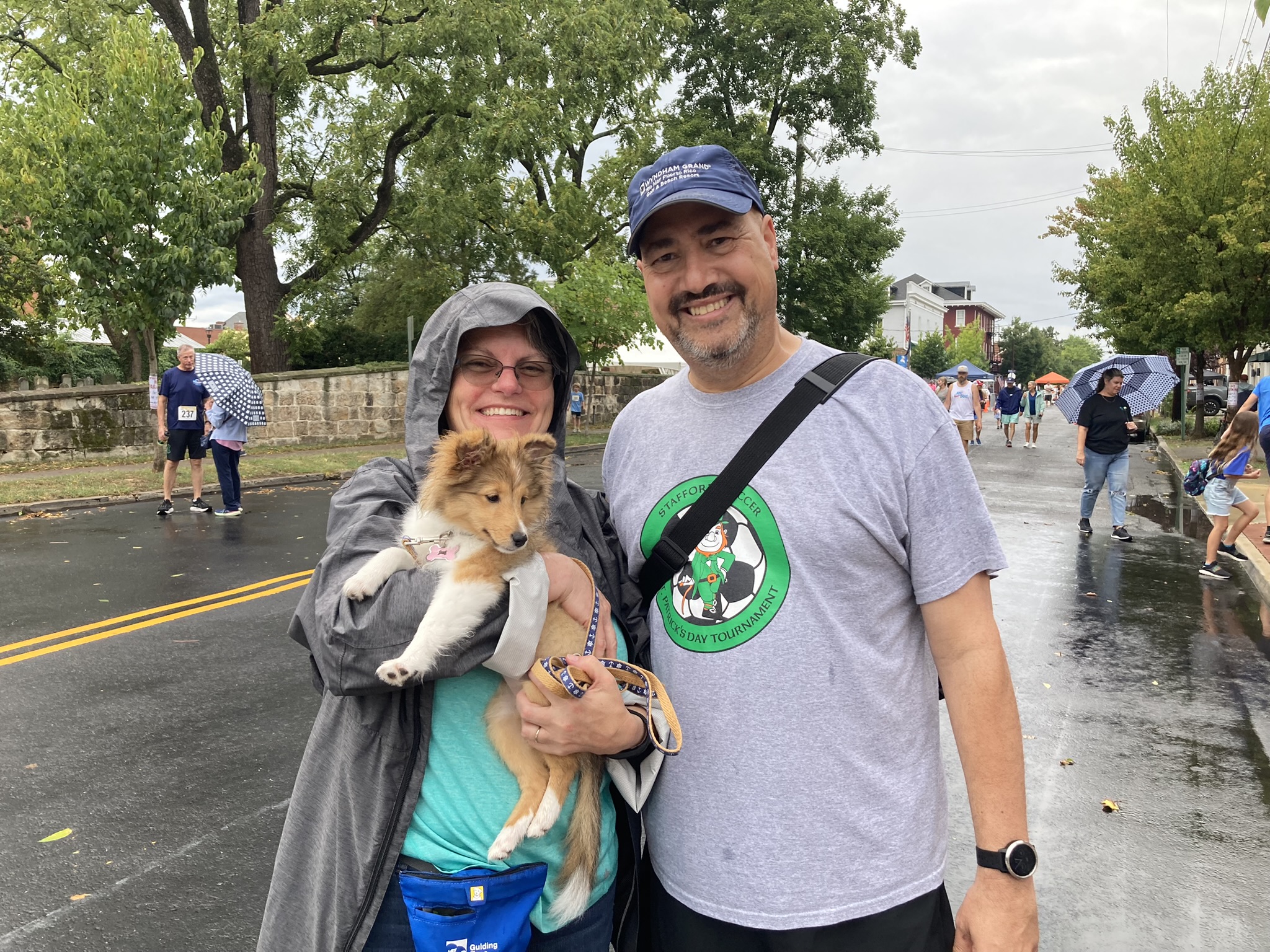
Volunteers helped out at the Downtown Mile for CASA, our annual fundraiser organized by the Fredericksburg Area Running Club.

CASA volunteers encountered lots of friendly faces at the Fredericksburg Pride Festival.
KEY OUTCOME MEASURES
In 2023-2024:
- CASA volunteers and/or staff attended 226 court hearings and submitted 127 CASA reports prior to court hearings. (Reports are required for many but not all hearings.)
- Judges considered 69% of CASA’s written recommendations and incorporated 97% of those considered into their court orders. Overall, judges incorporated 66% of CASA’s total recommendations into their court orders. (Some recommendations are made to highlight a concern and spur action by child welfare professionals but are not necessarily intended to trigger action by a judge.)
- 90% of foster children served by CASA were placed in safe, permanent homes when their cases closed in 2023-24. (We remained concerned about 4 teens whose cases closed: 3 were in congregate care settings that were safe but not permanent, and 1 was returned to his mother, who we did not believe was a safe caretaker.)
- 76% of foster care cases involving CASA ended within the 17-month timeline mandated by federal law. CASA’s foster care cases lasted an average of 363 days. (Court and procedural delays are among the factors that can stretch out some children’s cases.)
- CASA volunteers logged more than 16,000 “contacts,” or conversations with teachers, therapists, social workers, foster parents, parents and other service providers in the children’s lives to better understand the children’s needs and provide targeted advocacy.
In many ways in FY24, our efforts helped ensure that children’s best interests were served and that common sense prevailed – even when the system’s focus on laws and regulations threatened to overshadow what was plainly best and safest for kids. CASA’s voice mattered – for kids being brought to visits with parents they feared or children left in homes where they didn’t feel safe; for kids on the verge of returning to parents who couldn’t or wouldn’t protect them; for teens grappling with feelings of abandonment; and for families desperate to reunite and working hard to earn the chance.
In FY24, we feel confident our advocacy protected children and helped guide them to safe, permanent homes. We also feel positive about the concerted efforts we made to help foster teens prepare for adulthood – by completing written assessments of their life skills, assessing gaps in their knowledge, giving them a book on preparing for adulthood, and initiating conversations about topics such as how to get a job, how to handle money, how to access college and how to lead healthy lives.
The intervention CASA provides, in collaboration with social workers, Guardians ad litem and the court system, is crucial to increasing the likelihood that children suffering from atrociously adverse experiences can develop the resilience and coping skills needed to succeed in life. Child abusers are rarely held accountable by the criminal justice system. The civil court system in which CASA operates is often the only system holding child abusers accountable for their damaging actions.
OUR VOLUNTEERS
Our volunteers include educators, lawyers, government employees, stay-at-home parents, counselors, grandparents, retired service members and others. Each person brings an impressive mix of compassion, intellect and life experience to their work, and each passed comprehensive background checks before serving a child.
To advocate for children, CASA volunteers: 1) investigate the children’s lives; 2) identify the children’s needs; 3) speak up for the children’s best interests through written recommendations to judges; and 4) communicate with Guardians ad litem and others to promote the children’s well-being for the duration of each case. CASA’s recommendations address the children’s physical safety as well as their emotional, educational, health and other needs.
In FY 2023-2024, 40 Rappahannock Area CASA volunteers spent 4,855 hours advocating for abused and neglected children in the Fredericksburg area. Most of the children CASA served were involved in court cases in Spotsylvania County and the city of Fredericksburg, while others were in Stafford County.
Nonprofit research organization Independent Sector estimates the value of a volunteer hour in Virginia at $33.38. Based on this rate, Rappahannock Area CASA volunteers provided $162,060 worth of valuable service to our community in 2023-24.
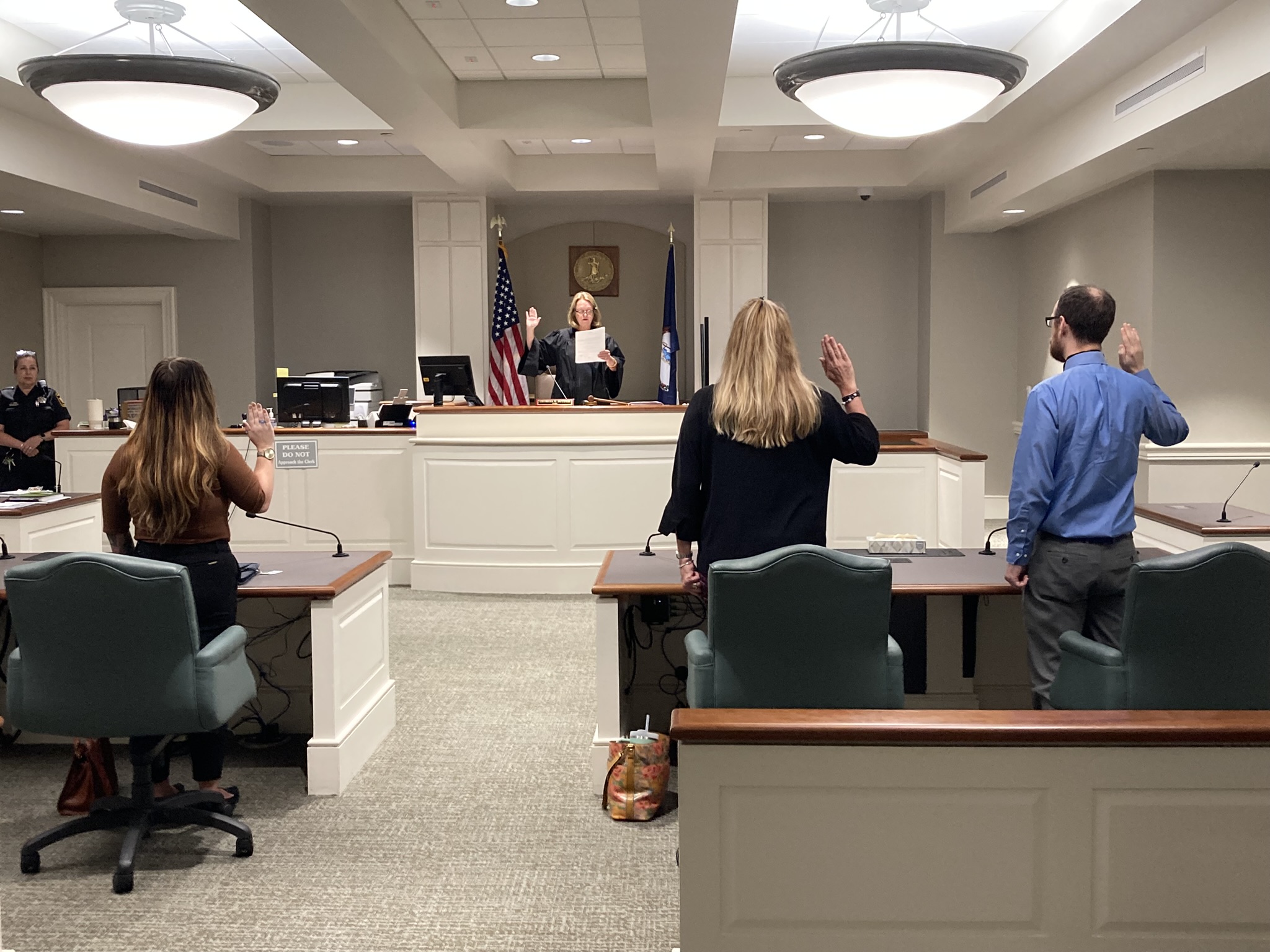
Eleven new CASA advocates were sworn in during FY24.
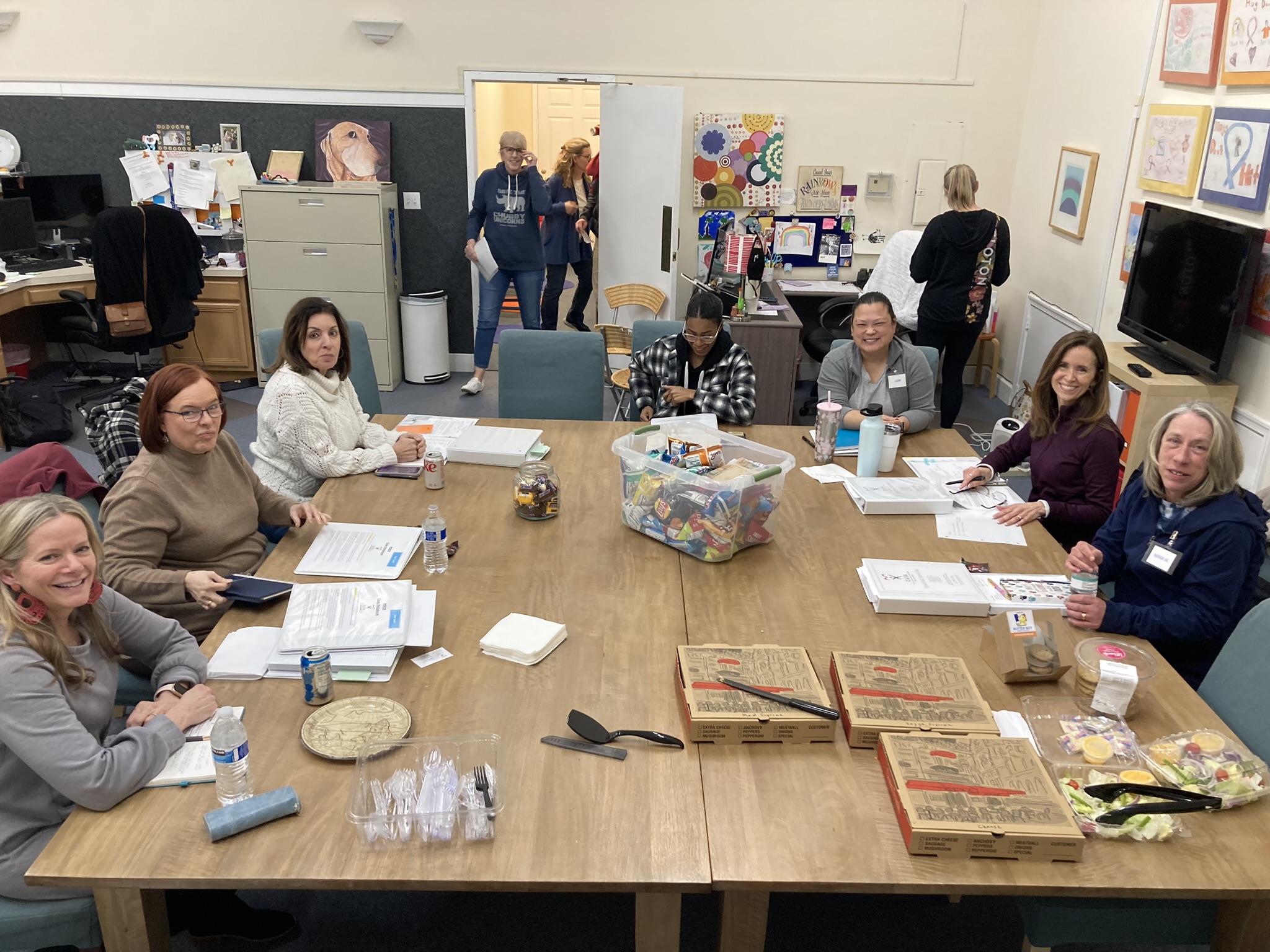
Advocates participated in a variety of training during FY24.
VOLUNTEER & STAFF TRAINING
In 2023-2024, Rappahannock Area CASA continued its volunteer recruitment and training efforts by:
- Training 11 new volunteers, who were sworn in by a judge after completing at least 32 hours of in-depth, pre-service training. All were quickly assigned to serve a child or a sibling group.
- Providing multiple opportunities for our volunteers to engage in continuing education. After their first year of service, CASA volunteers are required to participate in an extra 12 hours annually of ongoing training to maintain their certification. In 2023-24, our veteran CASAs completed nearly 300 hours of ongoing education, including completing workshops at the CASA office on the impact of substance abuse on families and how to deliver a life-saving dose of Narcan; participating in webinars addressing topics such as racial equity in foster care and advocating for neurodivergent children; and learning about effective report writing and LGBTQ+ issues in the child welfare system through Advo-Chats, sponsored by Virginia CASA College.
BOARD OF DIRECTORS
The Rappahannock Area CASA Board of Directors provides fiscal oversight, strategic planning and fundraising for our organization. Board members during FY24 included:
- President Barbara Miller-Richards, former Fredericksburg School Board member and parish secretary at St. George’s Episcopal Church
- Vice President Teri Cortese-Fusaro, an attorney and former CASA volunteer
- Secretary/Treasurer Marie Fredrick, healthcare consultant at Ramshorn LLC and former CASA volunteer
- Nancy Pcsolyar, a nurse and retired office manager at Mary Washington Neurology
- Bobby Anderson, former RCASA director and former CASA volunteer
- Robert Rycroft, retired Professor of Economics at the University of Mary Washington
- Jacinta Topps, pediatrician at Fall Hill Pediatrics
- Shondella Murray, Human Resources Specialist at NLRB and former CASA volunteer
- Jane McDonald, retired director of the Rappahannock Area Community Services Board
CASA CHILDREN
Rappahannock Area CASA serves children ages 0-21 from a variety of racial, ethnic, economic and other backgrounds. Demographic details about the 123 children we served in 2023-24 include:
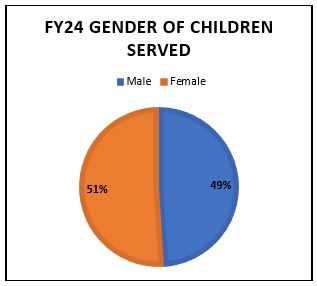
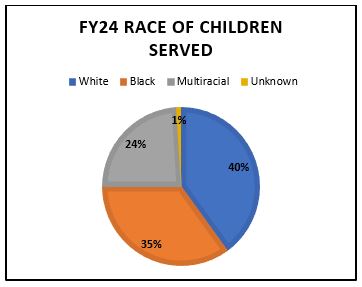
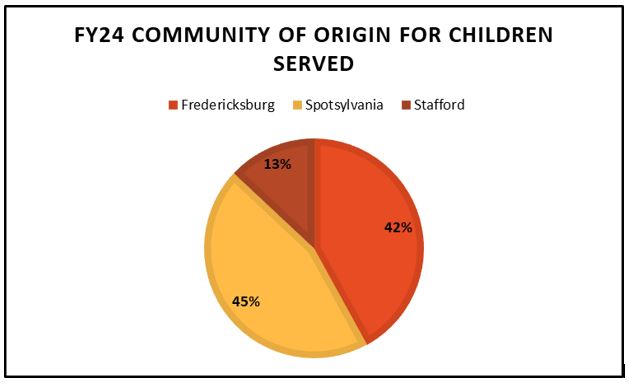
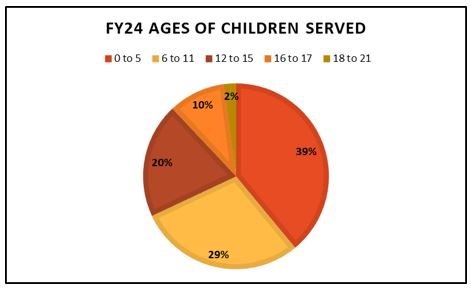
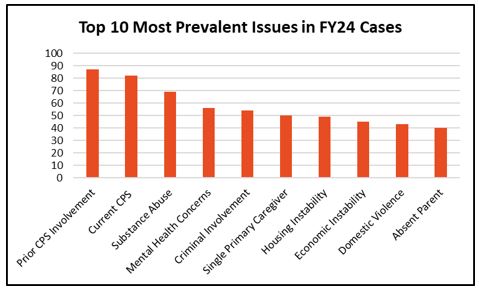
FINANCES
Rappahannock Area CASA continues to strive for diversified funding from numerous sources. During fiscal year 2023-24, here is where our funding came from – and how we spent it:
INCOME:
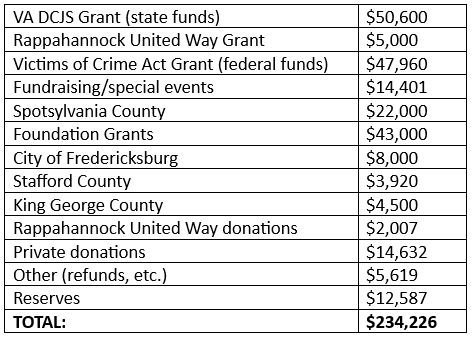
EXPENSES:
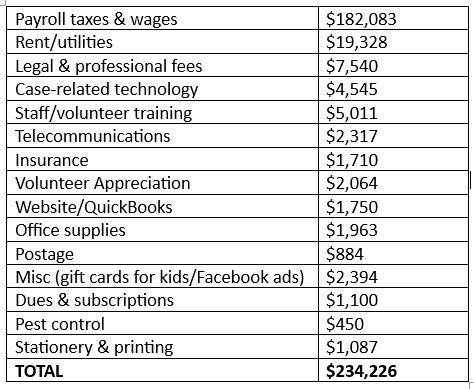
Note: CASA’s 2023-24 audit and financial statements have not yet been completed. Figures above are aligned with CASA’s QuickBooks accounting system’s Profit & Loss statement.
